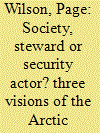| Srl | Item |
| 1 |
ID:
153855


|
|
|
|
|
| Summary/Abstract |
Conventional narratives about the body of law regulating the conduct of armed conflict conclude that what was once known as the ‘law of war’ (LoW) or the ‘law of armed conflict’ (LOAC) can equally be called international humanitarian law (IHL) today. Yet how and why IHL came to be used as a name for this field is not explained. Understanding the evolution of IHL nomenclature is important because it reveals the background conditions which made possible the changes to the governance of the British armed forces already revealed in this journal (Forster, 88: 2, 2012), and it explains the frequent recourse to IHL invocations by non-governmental organizations in the midst of contemporary armed conflicts. Contrary to orthodox narratives, this article demonstrates that IHL's origins, contents and purpose are altogether different from those of LOAC/LoW. Nevertheless, the article reveals a concerted effort to rebrand LOAC/LoW as IHL—first led by the International Committee of the Red Cross (ICRC), and then taken up by human rights groups from the 1980s onwards. For the latter, a shift to IHL was about providing a means to expand their work into armed conflict scenarios; it was not about improving the law or making it more effective for its own sake. For these reasons, the article argues that the myth of IHL is that it is a body of law at all. Rather, it is a political project by and for international humanitarian and human rights organizations in support of their own political objectives.
|
|
|
|
|
|
|
|
|
|
|
|
|
|
|
|
| 2 |
ID:
143341


|
|
|
|
|
| Summary/Abstract |
While a long-term decrease in overall Arctic sea ice extent has been recorded by the US National Snow and Ice Data Center (2014) since the late 1970s, the unprecedented levels of ice melting and thinning experienced in the region in 2007, and subsequently in 2012, have brought the Arctic once again to the forefront of international affairs. Much popular and academic attention has focused on whether the Arctic is likely to remain a zone of cooperation, or descend into conflict. However, less attention has been paid to examining the evolution and role of fora in the region, such as the Arctic Council. In this paper, it is argued that three visions are presently shaping ways of thinking about the Council: the first envisages the Council as a society for Arctic states; the second sees the Council as a steward for the Arctic; and the third imagines the Council as a fully-fledged security actor. The extent to which each vision is manifested in the practices of the Council and its members is also examined. Finally, the paper considers what the ongoing tensions within and among these three ways of conceptualising the Council means for its future prospects, and for Arctic politics more generally.
|
|
|
|
|
|
|
|
|
|
|
|
|
|
|
|